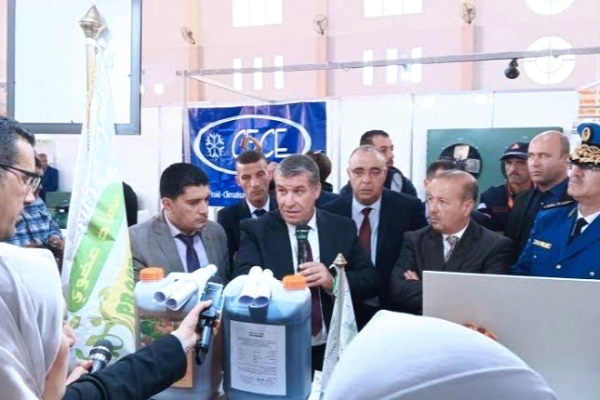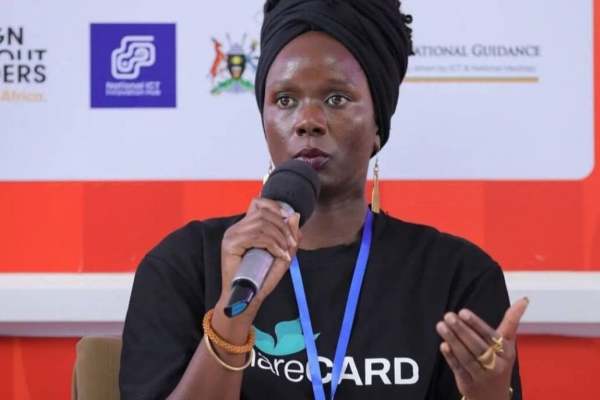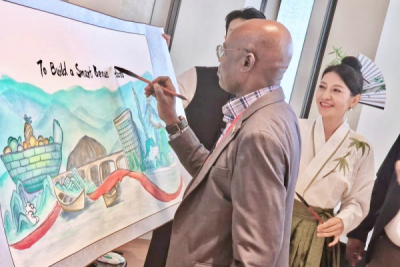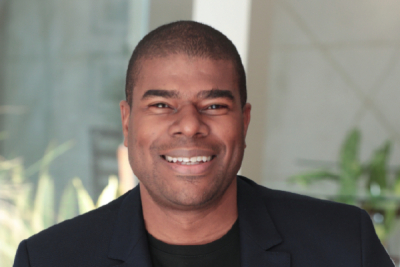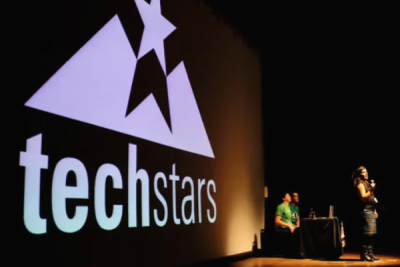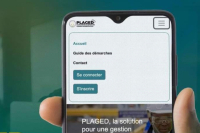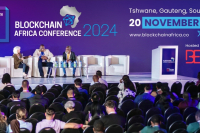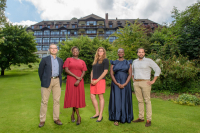Earlier last year, Algerian authorities launched the digitization of the national agricultural registry. They have completed the digitization goal ahead of schedule.
On Sunday, November 3, Mohamed Yazid Hambli, President of Algeria's National Chamber of Agriculture, announced the completion of the digitization of the National Agricultural Registry (RNA). The announcement was made during the opening ceremony of the second National Exhibition of Agricultural Equipment, Products, Livestock, Agribusiness, and Refrigeration in Mascara.
"The process of digitizing the National Agricultural Registry, initiated early last year and carried out by the National Chamber of Agriculture, is now fully complete. This initiative has allowed for the issuance of digital cards to farmers across all 58 wilayas," stated Mohamed Yazid Hambli (photo, center).
Under President Abdelmadjid Tebboune, Algeria has leveraged digital transformation as a driver of development since 2019, achieving substantial progress on various digital indicators. According to the International Telecommunication Union, Algeria reached a score of 80.9 on the ICT Development Index in 2024, up from 77.8 in 2023, marking a notable advancement in the tech sector.
However, the digitization of the RNA faces several challenges. Farmers and local agents require training to effectively use digital tools, while limited access to telecommunications networks in rural areas hinders connectivity. Robust measures are also essential to protect the privacy and security of farmers' sensitive data. These obstacles could reduce the initiative's effectiveness if not addressed.
If these challenges are overcome, the RNA digitization could transform agricultural resource management by enabling better monitoring of land, crops, and water resources. It would allow for more targeted subsidies and aid based on farmers' actual needs and improve transparency in production chains. By facilitating precise resource management and enhancing transparency in the agricultural sector, this initiative could support more sustainable and equitable agricultural development.
Adoni Conrad Quenum
She has over 10 years of experience in digital marketing and data management. As an entrepreneur, she strives to help organizations deliver the best services to underserved communities.
Sandra Awilli (photo) is a Ugandan serial entrepreneur. She is the founder and CEO of ShareCARD, a startup that leverages digital technology to support vulnerable populations across Africa.
Founded in 2022, ShareCARD aims to enhance the effectiveness of development projects by providing real-time data, accountability tracking tools, and impact mapping services. The platform enables users to streamline processes, optimize resources, and make well-informed decisions.
ShareCARD simplifies data collection, verification, and analysis, giving organizations up-to-date insights on beneficiaries' access to programs, which allows for swift responses to identified needs.
Before ShareCARD, Sandra Awilli founded Boldite Ltd in 2016, a digital marketing and creative agency that helps African businesses expand into online markets. In 2017, she launched PADShare Uganda, a tech startup focused on improving access to essential menstrual hygiene products.
Sandra Awilli holds a certification in social media training from Kyambogo College School, earned in 2012. Her career began in 2013 as a digital marketing manager for beverage brands Bell Lager and Smirnoff, as well as for Centenary Bank. From 2021 to 2022, she worked as a project manager for Africa 118 in Uganda, a Canadian company specializing in digital marketing, website design, and data services.
Melchior Koba
As part of its digital economy development plan, Nigeria is placing a strong emphasis on securing strategic partnerships. Each state in the country is ramping up efforts to deliver high-quality digital services to its citizens.
On Wednesday, October 30, Benue State Governor Hyacinth Iormem Alia (photo, center) announced a strategic partnership with Chinese tech group Huawei to accelerate digital transformation across the region. This agreement aims to modernize Benue's infrastructure, boost its economy, and improve the quality of life for its residents.
“This partnership with Huawei will revolutionize our state's infrastructure, enhance security, improve education [and] healthcare, and create countless job opportunities for our people. We must be intentional about the development of our state, for ourselves [and] future generations,” the governor explained on X (formerly Twitter).
The initiative is part of a broader effort to establish Benue State as a digital hub in Nigeria. It follows a recent agreement with EVNT Technologies, a Saudi-based IT company, to transform Benue’s technological landscape.
The Huawei partnership is expected to bolster local digital initiatives, particularly the Benue Tech Skills program, which aims to create over 50,000 jobs by training young people in essential digital skills. The program includes training in coding, advanced data analysis, UI/UX design, digital marketing, and e-commerce—all critical skills for the global digital economy.
These efforts align with the goals set by Nigeria’s Federal Ministry of Communications, Innovation, and Digital Economy under its strategic plan, “Accelerating our Collective Prosperity through Technical Efficiency.” This plan seeks to raise the digital sector’s contribution to Nigeria’s GDP to 22% by 2027, positioning the country as a leader in digital economy and tech innovation in Africa.
Samira Njoya
He has over 25 years of experience in developing digital services in Africa. His innovative solutions have earned him numerous awards and distinctions, both nationally and internationally.
Jil-Alexandre N’Dia (photo) is an Ivorian entrepreneur and the co-founder of Weblogy, a fintech and digital media group that aims to accelerate digital transformation across Africa.
Founded in 1998, Weblogy provides digital services primarily in French-speaking Africa, creating websites, mobile applications, and online marketing campaigns that deliver commercial advantages for businesses and brands. The company’s mission is to support African nations' development by integrating new technologies.
Beyond digital activities, Weblogy also offers consulting services and provides co-working spaces for startups to help them develop their projects. It is also committed to promoting financial inclusion and meeting the growing need for fast, secure payment solutions. Since 2016, it has offered Abidjan.net-branded prepaid VISA cards, designed in partnership with VISA and local banks. These reloadable e-wallets do not require a bank account. To simplify online payments, Weblogy also launched an application called APAYM, a portal that enables users to manage their Abidjan.net cards along with other domestic and international bank cards.
To date, Weblogy has completed more than 3,000 web and mobile projects for a portfolio of over 700 international clients. The company operates an independent ad network covering 48 countries, reaching over 20 million unique visitors per month, and is present in 11 countries through six offices and six commercial representations.
Jil-Alexandre N’Dia is also the president of the NGO J’aime Jacqueville, which promotes financial inclusion in rural areas, the spread of new technologies, and health and wellness initiatives. Additionally, he serves as vice president of the Kaydan Foundation. Founded by a group of Ivorian entrepreneurs, this organization seeks to foster a strong entrepreneurial culture in Africa, particularly in Côte d’Ivoire.
N’Dia holds a bachelor’s degree in Information Systems Management from Indiana University Bloomington, earned in 1999. He was honored with the Ivorian President's Youth Entrepreneurship Excellence Award in 2013 and received the second prize for Communication Development in 2019.
He is an Officer of the National Order of Côte d’Ivoire and of the Order of Ivorian Merit. In 2021, he received the award for Best Fintech in Francophone Africa, presented by Global Technology Partners in partnership with Visa. In 2022, N’Dia was promoted to Commander of the Order of Merit for Posts and Telecommunications in Côte d’Ivoire.
Melchior Koba
After supporting the development of around twenty promising startups, global accelerator Techstars has announced its withdrawal from Nigeria, a country where the startup ecosystem is experiencing rapid growth.
Techstars, a global startup accelerator and venture capital firm, is ending its operations in Nigeria after two years. The decision follows the conclusion of its partnership with ARM Labs, the Nigerian innovation entity with which it launched the ARM Labs Lagos Techstars Accelerator program.
“Techstars’ partnership with ARM Labs has ended, and we will not proceed with a third ARM Labs Lagos Techstars Accelerator Program. The first two cohorts featured outstanding companies and founders, supported by a dedicated group of mentors.We remain optimistic about collaborating with the local startup community to maintain our presence in this vibrant innovation hub,” said Matthew Grossman, Techstars’ global Chief Brand and Communications Officer.
Techstars and ARM Labs partnered in December 2022 to create an accelerator program to support early-stage African startups. Over two cohorts, the program added 24 startups to the Techstars portfolio, each receiving up to $120,000 in funding.
Techstars’ exit from Nigeria comes as the accelerator adjusts its finances, recently cutting 17% of its global workforce. This move raises concerns about the impact on Nigeria’s startup ecosystem, particularly regarding access to crucial resources and support. However, startups already funded through the ARM Labs Lagos Techstars Accelerator will remain part of Techstars’ portfolio and continue to benefit from its global network.
Samira Njoya
Dans plusieurs pays, le service postal occupe une place clé dans l’économie. Cependant, cette institution publique a progressivement perdu de son influence en raison d’un manque de vision stratégique. Aujourd’hui, grâce aux TIC, il devient possible de la réinventer pour répondre aux besoins actuels.
La Cameroon Postal Services (Campost), un opérateur public postal du Cameroun, a signé le vendredi 1er novembre un partenariat stratégique avec FindMe, une start-up camerounaise spécialisée dans l’identification et la géolocalisation. Cette collaboration vise à résoudre le problème de localisation au Cameroun, où une grande majorité de la population ne dispose pas d’une adresse postale officielle.
« Avec le boom de l'e-commerce, il est important pour le service postal de se réinventer afin de mieux satisfaire les clients, en répondant aux besoins de livraison jusqu’au dernier kilomètre et en optimisant nos services financiers grâce à une meilleure identification de nos clients bancaires, en conformité avec les exigences de KYC (Know your customer) », a déclaré Pierre Kaldadak (photo, à droite), directeur général de la Campost.
L'initiative s'inscrit dans la vision de modernisation et de transformation de la poste camerounaise. Elle fait suite à plusieurs mois de collaboration entre la Campost et la start-up FindMe, permettant l’implantation de cette solution au Cameroun depuis juillet 2024. Les premiers travaux ont également permis au gouvernement de créer des codes postaux couvrant l’ensemble du territoire national. Grâce au partenariat, chaque citoyen camerounais et chaque entreprise camerounaise peuvent désormais générer gratuitement une adresse postale en seulement deux minutes via l’application mobile de FindMe. Cette adresse fournit des informations précises, notamment le numéro d’occupation, le nom de la rue, le code postal et la ville.
Au Cameroun, ce système numérisé devrait notamment améliorer l'efficacité des services de secours et des forces de sécurité, accélérer le développement de l’e-commerce et des services postaux, et faciliter les opérations des services fiscaux et fonciers, contribuant ainsi au développement économique national. L’objectif plus large est de créer un référentiel national d’adressage sur lequel les services publics pourront s’appuyer pour déployer leurs diverses opérations.
Samira Njoya
Lire aussi:
Guinea is making strides in digitalizing its public administration, but there's still room for improvement. According to the United Nations, the country's digital governance score increased from 0.2955 in 2022 to 0.4006 in 2024. Despite this progress, Guinea remains behind and is working to accelerate its digital transformation.
The Guinean Ministry of Commerce, Industry, and Small and Medium Enterprises recently announced the upcoming launch of an administrative document management platform (PLAGED) on November 13. This platform aims to simplify administrative procedures for citizens, marking a significant step toward digital governance in Guinea.
This initiative follows Guinean Prime Minister Bah Oury’s recent call for a concerted push to improve the country's digital administration, where progress has lagged. Oury attributes this delay to limited familiarity with the rapid evolution of digital technologies. According to the United Nations' report "E-Government Survey 2024: Accelerating Digital Transformation for Sustainable Development," Guinea scored 0.4006 out of 1 on the E-Government Development Index (EGDI), ranking 29th on the continent. This is an improvement from a score of 0.2955 in 2022, reflecting gradual progress in online government services.
The report also noted Guinea’s Online Service Index score of 0.4808, which assesses the technical features of national websites as well as policies and strategies for online service delivery across general and sectoral levels.
Earlier this year, in April, Guinean authorities launched “e-Learning” and “e-Consulting” initiatives to modernize administrative processes with innovative training and management tools. The introduction of PLAGED aligns with these efforts, supporting the government’s digital strategy to improve service delivery and accelerate the adoption of digital tools across public administration.
Adoni Conrad Quenum
Bitcoin Events is organizing The Blockchain Africa Conference 2024. This 10th edition aims to showcase advancements in Africa’s blockchain and cryptocurrency sectors.
The event will convene blockchain developers, investors, and industry leaders at the CSIR International Convention Centre in Pretoria on November 20, 2024.
Speakers include Charles Hoskinson, Founder of Cardano, Ernest Mbenkum, CEO of Interstellar Inc., and Stafford Masie, former CEO of Google Africa. A special fireside chat will feature blockchain pioneers Elizabeth Rossiello and Ernest Mbenkum reflecting on a decade of industry growth.
Pan-African venture capital firm Janngo Capital has finalized its second fund at $78 million, it announced on October 30. This further advances its commitment to early-stage tech startups across Africa.
Janngo distinguishes itself as a "gender-equal" investor, with 56% of its portfolio companies being women-led, given that Africa has the highest rate of female entrepreneurship globally, yet receives minimal VC backing for female founders.
The firm’s investments target diverse sectors including healthcare, logistics, financial services, retail, agritech, mobility, and the creator economy.
Social media plays a key role in election integrity by enabling citizens to report incidents, share information, and foster transparency. Civil society organizations have raised concerns that restrictions can harm both democracy and economic growth, underlining the long-term impacts on citizens’ rights and national development.
Mauritius's Information and Communication Technologies Authority (ICTA) has directed all internet service providers to block access to social media platforms from Friday November 1 through November 11. The announcement was made in a communique dated November 1, by the authority.
The restriction comes in response to “concerns regarding illegal postings that constitute a serious threat to national security and public safety," the communique reads.
This scenario in Mauritius is part of a broader trend in Africa, where several countries have implemented internet shutdowns or social media restrictions during elections or periods of civil unrest in recent years. For example, in Uganda’s 2021 election, social media was restricted, with authorities citing security concerns.
Between 2020 and 2023, at least 22 African countries enforced full or partial internet shutdowns, resulting in an estimated $3.9 billion in economic losses, according to consulting firm Africa Practice, which advises investors and development partners across the continent.
Hikmatu Bilali
More...
Investing in digital skills accelerates regional tech development and prepares African nations for a digital future. This approach helps address critical challenges. Additionally, it tackles the region’s high youth unemployment, creating more opportunities for the next generation.
Nigeria announced a N2.8 billion ($1.7 million) commitment from Google to support the digital economy. The investment was led by Matt Brittin, Google’s President of EMEA Business & Operations. Announced on October 31 by the Minister of Communications, Innovation, and Digital Economy, this commitment aligns with Nigeria’s Strategic Blueprint for Digital Transformation.
The minister of Communications, Innovation, and Digital Economy commented on the move saying, “I appreciate the entire Google team for betting big on our technology ecosystem and their continued support. I look forward to building on our partnership, as we continue on our path of Digital Transformation in Nigeria.”
Such investments come as digital growth becomes increasingly essential. According to the National Bureau of Statistics, Nigeria's digital economy contributed 16.36% to the country’s GDP as of Q2 2024, just behind trade and Agriculture. This underscores the strategic importance of fostering technological innovation and skills to further boost economic resilience and global competitiveness.
The investment will fund initiatives to train 20,000 Nigerians in AI and Data Science, introduce 125,000 young students to AI fundamentals, support over 1,000 public officials in AI-driven governance, and empower 10 Nigerian AI startups with funding, tools, and mentorship.
Google's support aims to strengthen Nigeria's role in the global digital economy by promoting technical skills and fostering innovation nationwide. This effort is part of a broader $5.8 million investment to advance AI skilling programs across Sub-Saharan Africa.
Hikmatu Bilali
A serial entrepreneur, he has already founded three companies in the science and technology sector. His latest startup aims to simplify payment processes for businesses.
Mohamed Abdelmottaleb (photo) is an Egyptian serial entrepreneur, managing partner, and founder of XPay, a fintech company focused on digital transformation and financial empowerment.
Founded in 2018, XPay aims to enhance quality of life by offering a suite of solutions to streamline financial management. The platform enables businesses to handle various payment types with ease, providing multiple transaction options and complete control through a unified dashboard.
XPay also simplifies end-to-end event management for organizers, covering everything from event creation to ticket sales and providing unique payment links to facilitate transactions. Its innovative payment gateway is adaptable for businesses of all sizes, enabling a smooth, simplified payment process for online operations.
Before founding XPay, Abdelmottaleb launched SabryCorp Ltd in 2006, a company dedicated to improving living conditions in developing countries through science and innovation. In 2011, he co-founded Trendak, a firm specializing in data analytics and artificial intelligence.
Abdelmottaleb graduated from Ain Shams University with a bachelor’s degree in chemistry in 1997 and earned a Ph.D. in nanotechnology from KU Leuven, a leading multidisciplinary research university in Belgium, in 2002.
In 2004, he joined Chemnitz University of Technology in Germany as a senior researcher, and in 2009, he became an assistant professor at Nile University in Egypt. There, he founded the Nanotechnology Center and led the university’s nanotechnology master’s program for five years.
Melchior Koba
The Ghanaian government is ramping up efforts to bridge the country’s digital skills gap. Officials recently announced plans to launch a $5 million fund aimed at fostering technological innovation.
Ursula Owusu-Ekuful (photo, left), Ghana’s Minister of Communications and Digitalisation, launched the “eSkills4Jobs” program last week. The initiative aims to equip over 5,000 young Ghanaians with essential digital skills, with a focus on supporting women from marginalized communities and people with disabilities.
The program is a partnership between the Ghanaian government, the World Bank, and the Ghana-India Kofi Annan Centre of Excellence in ICT.
“The digital economy is here to stay, and we must ensure no one is left behind. eSkills4Jobs will focus on creating tailored training programs, mentorship opportunities, and access to resources to enable participants to build relevant skills,” Owusu-Ekuful said.
The initiative aligns with the Ghanaian government’s broader goal of training one million young people in digital skills to meet the demand for a skilled workforce in a rapidly digitalizing economy. According to the International Finance Corporation (IFC), 20% of Ghanaian companies currently rely on foreign recruitment for digital skills, primarily because they cannot find qualified local talent. The World Bank estimates that approximately 625 million Africans will require digital skills by 2030.
The Ghanaian government believes that the skills acquired through the eSkills4Jobs initiative will not only enhance individual employability but also contribute to the overall growth of Ghana’s economy. World Bank data from 2022 shows that 3.1% of Ghana’s active workforce is unemployed.
Isaac K. Kassouwi
High-quality, easily accessible multisectoral data enable a clearer understanding of countries’ macroeconomic situations. Achieving this, however, requires a technological leap that many countries have yet to make. Ethiopia has chosen to make the leap.
Ethiopia is accelerating the digital transformation of its statistics service to enhance data collection and analysis capabilities.
Planning and Development Minister Fitsum Assefa announced this during her opening address at the 9th African Statistics Forum on Wednesday, October 30. The goal is to improve data quality, accessibility, and leverage innovative technologies to diversify and optimize information sources.
"We must embrace technology and digital tools to improve the accuracy, accessibility, and timeliness of our data, ensuring that we meet the growing demands for high-quality information at both the national and global levels," said Fitsum Assefa, underscoring Ethiopia's commitment to becoming a key player in the field of statistics.
This initiative is part of Ethiopia's National Statistics Development Program, which integrates advanced technologies such as digital geospatial systems and mobile data collection tools. Supported by both national and international institutions, this modernization project aims to make Ethiopia's statistical infrastructure more responsive and better suited to the country's complex data needs.
The digitalization of statistics aligns with a broader continental effort led by the United Nations Economic Commission for Africa (UNECA), which has created a roadmap to modernize African statistical systems by 2030. By promoting the adoption of international standards, UNECA seeks to equip African countries with reliable data systems, crucial for guiding sustainable development and enabling informed, data-driven decision-making.
Samira Njoya


